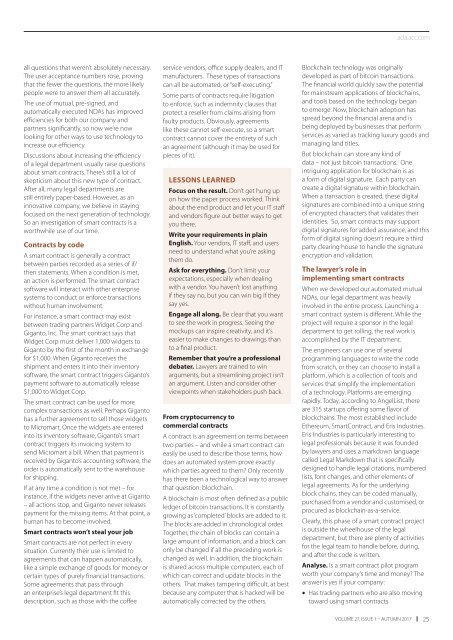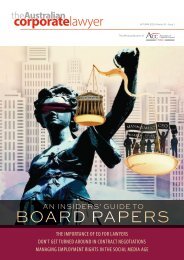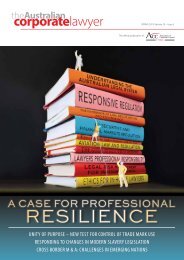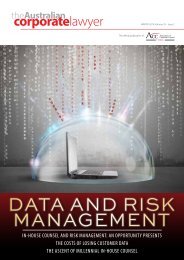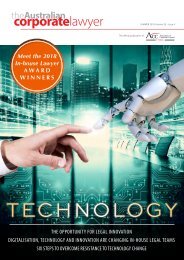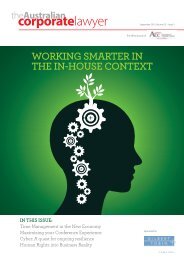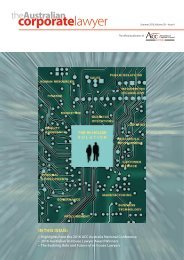Australian Corporate Lawyer - Autumn 2017
Australian Corporate Lawyer is the official publication of the Association of Corporate Counsel (ACC) Australia. The Autumn 2018 issue focuses on 'The Law and Technology' and features a range of articles covering topics including: the future of contracts and; the future of law firms as software companies..
Australian Corporate Lawyer is the official publication of the Association of Corporate Counsel (ACC) Australia. The Autumn 2018 issue focuses on 'The Law and Technology' and features a range of articles covering topics including: the future of contracts and; the future of law firms as software companies..
You also want an ePaper? Increase the reach of your titles
YUMPU automatically turns print PDFs into web optimized ePapers that Google loves.
acla.acc.com<br />
all questions that weren’t absolutely necessary.<br />
The user acceptance numbers rose, proving<br />
that the fewer the questions, the more likely<br />
people were to answer them all accurately.<br />
The use of mutual, pre-signed, and<br />
automatically executed NDAs has improved<br />
efficiencies for both our company and<br />
partners significantly, so now we’re now<br />
looking for other ways to use technology to<br />
increase our efficiency.<br />
Discussions about increasing the efficiency<br />
of a legal department usually raise questions<br />
about smart contracts. There’s still a lot of<br />
skepticism about this new type of contract.<br />
After all, many legal departments are<br />
still entirely paper-based. However, as an<br />
innovative company, we believe in staying<br />
focused on the next generation of technology.<br />
So an investigation of smart contracts is a<br />
worthwhile use of our time.<br />
Contracts by code<br />
A smart contract is generally a contract<br />
between parties recorded as a series of if/<br />
then statements. When a condition is met,<br />
an action is performed. The smart contract<br />
software will interact with other enterprise<br />
systems to conduct or enforce transactions<br />
without human involvement.<br />
For instance, a smart contract may exist<br />
between trading partners Widget Corp and<br />
Giganto, Inc. The smart contract says that<br />
Widget Corp must deliver 1,000 widgets to<br />
Giganto by the first of the month in exchange<br />
for $1,000. When Giganto receives the<br />
shipment and enters it into their inventory<br />
software, the smart contract triggers Giganto’s<br />
payment software to automatically release<br />
$1,000 to Widget Corp.<br />
The smart contract can be used for more<br />
complex transactions as well. Perhaps Giganto<br />
has a further agreement to sell those widgets<br />
to Micromart. Once the widgets are entered<br />
into its inventory software, Giganto’s smart<br />
contract triggers its invoicing system to<br />
send Micromart a bill. When that payment is<br />
received by Giganto’s accounting software, the<br />
order is automatically sent to the warehouse<br />
for shipping.<br />
If at any time a condition is not met – for<br />
instance, if the widgets never arrive at Giganto<br />
– all actions stop, and Giganto never releases<br />
payment for the missing items. At that point, a<br />
human has to become involved.<br />
Smart contracts won’t steal your job<br />
Smart contracts are not perfect in every<br />
situation. Currently their use is limited to<br />
agreements that can happen automatically,<br />
like a simple exchange of goods for money or<br />
certain types of purely financial transactions.<br />
Some agreements that pass through<br />
an enterprise’s legal department fit this<br />
description, such as those with the coffee<br />
service vendors, office supply dealers, and IT<br />
manufacturers. These types of transactions<br />
can all be automated, or “self-executing.”<br />
Some parts of contracts require litigation<br />
to enforce, such as indemnity clauses that<br />
protect a reseller from claims arising from<br />
faulty products. Obviously, agreements<br />
like these cannot self-execute, so a smart<br />
contract cannot cover the entirety of such<br />
an agreement (although it may be used for<br />
pieces of it).<br />
LESSONS LEARNED<br />
Focus on the result. Don’t get hung up<br />
on how the paper process worked. Think<br />
about the end product and let your IT staff<br />
and vendors figure out better ways to get<br />
you there.<br />
Write your requirements in plain<br />
English. Your vendors, IT staff, and users<br />
need to understand what you’re asking<br />
them do.<br />
Ask for everything. Don’t limit your<br />
expectations, especially when dealing<br />
with a vendor. You haven’t lost anything<br />
if they say no, but you can win big if they<br />
say yes.<br />
Engage all along. Be clear that you want<br />
to see the work in progress. Seeing the<br />
mockups can inspire creativity, and it’s<br />
easier to make changes to drawings than<br />
to a final product.<br />
Remember that you’re a professional<br />
debater. <strong>Lawyer</strong>s are trained to win<br />
arguments, but a streamlining project isn’t<br />
an argument. Listen and consider other<br />
viewpoints when stakeholders push back.<br />
From cryptocurrency to<br />
commercial contracts<br />
A contract is an agreement on terms between<br />
two parties – and while a smart contract can<br />
easily be used to describe those terms, how<br />
does an automated system prove exactly<br />
which parties agreed to them? Only recently<br />
has there been a technological way to answer<br />
that question: blockchain.<br />
A blockchain is most often defined as a public<br />
ledger of bitcoin transactions. It is constantly<br />
growing as ‘completed’ blocks are added to it.<br />
The blocks are added in chronological order.<br />
Together, the chain of blocks can contain a<br />
large amount of information, and a block can<br />
only be changed if all the preceding work is<br />
changed as well. In addition, the blockchain<br />
is shared across multiple computers, each of<br />
which can correct and update blocks in the<br />
others. That makes tampering difficult, at best<br />
because any computer that is hacked will be<br />
automatically corrected by the others.<br />
Blockchain technology was originally<br />
developed as part of bitcoin transactions.<br />
The financial world quickly saw the potential<br />
for mainstream applications of blockchains,<br />
and tools based on the technology began<br />
to emerge. Now, blockchain adoption has<br />
spread beyond the financial arena and is<br />
being deployed by businesses that perform<br />
services as varied as tracking luxury goods and<br />
managing land titles.<br />
But blockchain can store any kind of<br />
data – not just bitcoin transactions. One<br />
intriguing application for blockchain is as<br />
a form of digital signature. Each party can<br />
create a digital signature within blockchain.<br />
When a transaction is created, these digital<br />
signatures are combined into a unique string<br />
of encrypted characters that validates their<br />
identities. So, smart contracts may support<br />
digital signatures for added assurance, and this<br />
form of digital signing doesn’t require a third<br />
party clearing house to handle the signature<br />
encryption and validation.<br />
The lawyer’s role in<br />
implementing smart contracts<br />
When we developed our automated mutual<br />
NDAs, our legal department was heavily<br />
involved in the entire process. Launching a<br />
smart contract system is different. While the<br />
project will require a sponsor in the legal<br />
department to get rolling, the real work is<br />
accomplished by the IT department.<br />
The engineers can use one of several<br />
programming languages to write the code<br />
from scratch, or they can choose to install a<br />
platform, which is a collection of tools and<br />
services that simplify the implementation<br />
of a technology. Platforms are emerging<br />
rapidly. Today, according to AngelList, there<br />
are 315 startups offering some flavor of<br />
blockchains. The most established include<br />
Ethereum, SmartContract, and Eris Industries.<br />
Eris Industries is particularly interesting to<br />
legal professionals because it was founded<br />
by lawyers and uses a markdown language<br />
called Legal Markdown that is specifically<br />
designed to handle legal citations, numbered<br />
lists, font changes, and other elements of<br />
legal agreements. As for the underlying<br />
block chains, they can be coded manually,<br />
purchased from a vendor and customised, or<br />
procured as blockchain-as-a-service.<br />
Clearly, this phase of a smart contract project<br />
is outside the wheelhouse of the legal<br />
department, but there are plenty of activities<br />
for the legal team to handle before, during,<br />
and after the code is written.<br />
Analyse. Is a smart contract pilot program<br />
worth your company’s time and money? The<br />
answer is yes if your company:<br />
• Has trading partners who are also moving<br />
toward using smart contracts<br />
VOLUME 27, ISSUE 1 – AUTUMN <strong>2017</strong><br />
25


